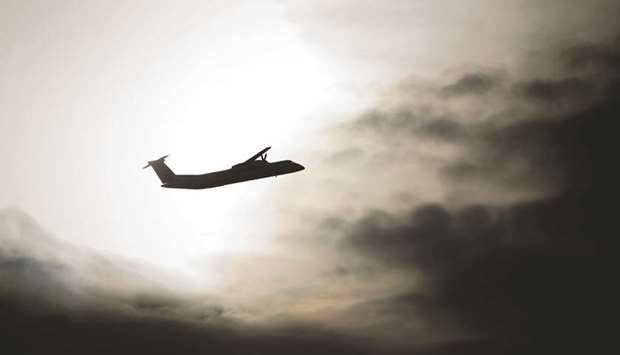The Covid-19 crisis has had a severe impact on global air traffic. The recent turn of events as a result of coronavirus is almost without much precedence.
The aviation industry supports $2.7tn (3.6%) of the world’s gross domestic product (GDP). If aviation were a country, it would rank 20th in size by GDP.
But the industry has seen a dramatic fall in demand from both passengers and shippers as a result of Covid-19.
What started as an epidemic in China and the Asia-Pacific region, initially, has now spread globally, raising real concerns of a pandemic.
An estimate is that the industry could lose $63bn, roughly 11% of global revenues, if only the outbreak is limited to the major centres in Europe and the Middle East.
Due to the Covid-19 crisis, airlines are experiencing serious declines in demand.
Brian Pearce, IATA’s chief economist, says it is possible that if there is a wider spread, revenue loss could grow to $113bn, roughly 19% of global airline revenues, which is sort of the equivalent that was seen during the global financial crisis in 2008.
“We are in a crisis situation here,” Pearce noted recently.
The International Air Transport Association, meanwhile, has placed a demand before aviation regulators worldwide that the rules governing use of airport slots be suspended immediately and for the 2020 summer season.
Around 43% of all passengers depart from over 200 slot co-ordinated airports worldwide. At present, the rules for slot allocation mean that airlines must operate at least 80% of their allocated slots under normal circumstances.
Failure to comply with this means the airline loses its right to the slot in the next “equivalent season”. In exceptional circumstances, regulators can relax this requirement.
Given the extraordinary circumstances as a result of the public health emergency, the collective view of the airline industry is that the application of the 80% rule during the upcoming season is grossly inappropriate.
Flexibility is needed for airlines to adjust their schedules according to extraordinary demand developments.
According to IATA, regulators have already been waiving the slot rules on a rolling basis during the Covid-19 crisis primarily for operations to China and Hong Kong Special Administrative Region.
However, given the recent further outbreaks this is no longer contained to the Asia markets. Without certainty that these waivers will continue for the summer season (or winter season in the Southern hemisphere), airlines are unable to plan ahead sufficiently to ensure efficient rostering of crew or deployment of aircraft.
Suspending the requirement for the entire season (up to October) will mean that airlines can respond to market conditions with appropriate capacity levels, avoiding any need to run empty services in order to maintain slots.
Aircraft can be reallocated to other routes or parked; crew can have certainty on their schedules.
IATA’s director general and CEO Alexandre de Juniac said, “IATA research has shown that traffic has collapsed on key Asian routes and that this is rippling throughout the air transport network globally, even between countries without major outbreaks of Covid-19.
“There are precedents for previous suspension of the slot use rules and we believe the circumstances again calls for a suspension to be granted. We are calling for regulators worldwide to help the industry plan for today’s emergency, and the future recovery of the network, by suspending the slot use rules on a temporary basis.”
“The world is facing a huge challenge to prevent the spread of Covid-19 while enabling the global economy to continue functioning. Airlines are on the front line of that challenge and it’s essential that the regulatory community work with us to ensure airlines are able to operate in the most sustainable manner, both economically and environmentally, to alleviate the worst impacts of the crisis,” he said.
Pearce noted airlines are doing a lot to help themselves.
“They are cutting back on capacity... they are cutting their own costs. But that’s not going to be sufficient to offset the revenue impact.
“If governments want to see productivity maintained… to support consumers and businesses, the industry needs support. In particular, the industry needs support in congested airports where there are slot restrictions. It needs waivers on the slot rules. It needs help through this cash flow crisis, both temporary government support, but also support from providers of credit and other finance,” Pearce noted.
However, the industry can heave a sigh of relief, if a proposal before the European Commission materialises.
EC president Ursula von der Leyen said the Commission will put forward (very rapidly) legislation regarding the so-called airport slots. The European Commission wants to make it easier for airlines to keep their airport slots even if they do not operate those slots because of the declining traffic.
A temporary measure to help the aviation industry and also the environment, is by avoiding the so-called ‘ghost flights’, where airlines fly almost empty planes just to keep their airport slots.
Der Leyen admitted, “The coronavirus outbreak has had a major on the European and international aviation industry. We see that the situation is deteriorating on a daily basis and air traffic is expected to decline further.”
Certainly, the aviation industry is going through an unprecedented crisis. It needs urgent help. Airlines are doing their best to stay afloat as they perform the vital task of linking the world’s economies.
As governments look to stimulus measures, the airline industry will need consideration for relief on taxes, charges and slot allocation, globally.
Governments must take note.
* Pratap John is Business Editor at Gulf Times.

An estimate is that the aviation industry could lose $63bn, roughly 11% of global revenues, if only the outbreak is limited to the major centres in Europe and the Middle East.

